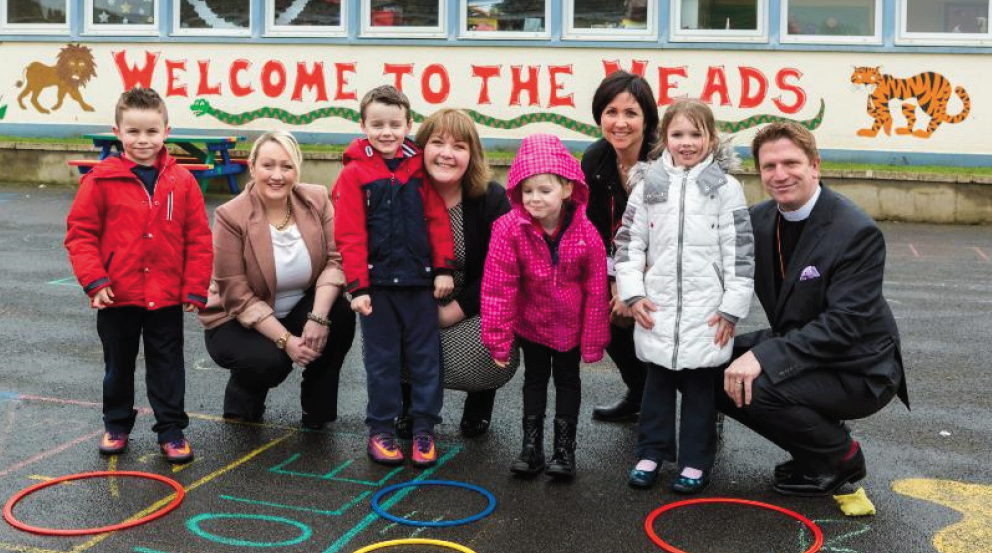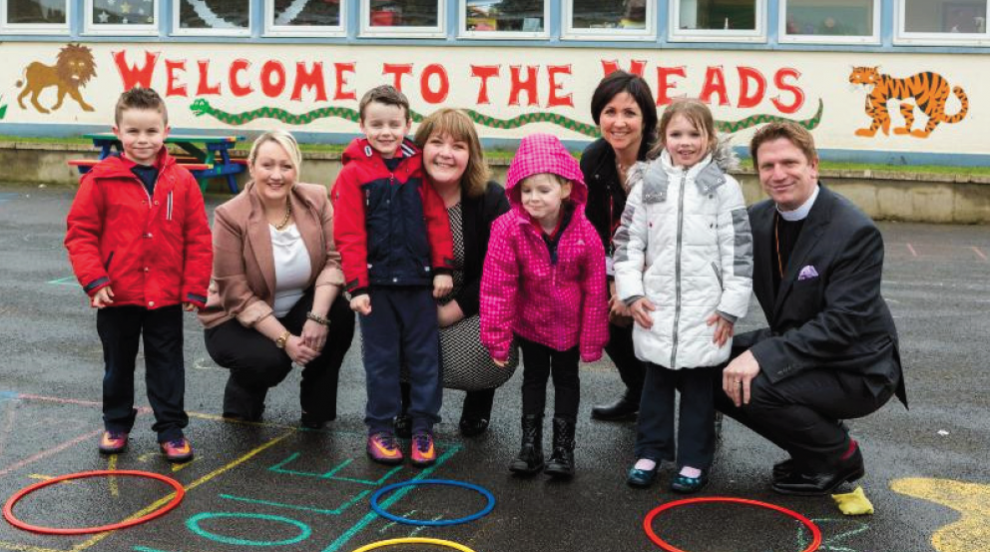
REBECCA EVANS AM, Minister for Social Services and Public Health has visited The Meads Infant and Nursery School in Milford Haven to see the impact of the SKIP project – Successful Kinesthetic Instruction for Pre-schoolers.
The SKIP project is a major programme of professional development in West Wales that aims to develop pupils’ motor development in the Foundation Phase. SKIP is run by the Wales Institute of Physical Literacy, part of the University of Wales Trinity Saint David, and The Meads School was one of 100 schools that trialled the innovative scheme.
The programme is part of the Welsh Government funded Physical Literacy Programme for Schools which the Wales Institute for Physical Literacy manages in the region.
It is led by Dr Nalda Wainwright, Director of the Wales Institute of Physical Literacy, who has been instrumental in changing behaviour by working with schools across south west Wales.
“We are facing issues that we have never encountered before in our society,” says Dr Wainwright.
“As a result of the increased levels of inactivity in children it has been predicted that they may die five years earlier than their parents despite improvements in modern medicine.
“The bill to the NHS is estimated to be £30b for the treatment of conditions linked to inactivity, which is one of the leading risk factors for death worldwide. Changes in society have created a ‘perfect storm’ for sedentary behaviours. “Modern technology, lack of green space, fear of strangers, a habit of driving, baby gadgets, coffee shop culture and screen time have all eroded time that would have been spent moving.
“Research into the implementation of the Foundation Phase shows that in Wales we have a potential solution to this with a world leading play based early childhood curriculum.
“However, this potential has not been realised as teachers and supporting adults don’t always have the necessary knowledge to ensure children are having appropriate experiences to develop the important movement foundations for good brain development and life-long physical activity.
“Drawing on research which identified the gap in knowledge, a programme of training and support was implemented in target schools.”
Working with Professor Jackie Goodway of The Ohio State University and honorary research fellow at the Wales Institute of Physical Literacy, SKIP trains teachers, teaching assistants and parents about the importance of early movement for child development. The training shows how children learn to move through developmental stages; how to alter tasks and the environment to move children through these stages, and crucially, to achieve the mastery of these skills needed for life long physical activity.
Part of this project also involves running parental engagement sessions with parents taking a bag of equipment home to play with their children and in some cases, even taking over the running of sessions.
“We have been assessing the impact of the project on samples of pupils from schools across the region. The analysis of the data thus far shows we are having a significant impact on pupils’ motor skill development. Importantly, teachers are developing their understanding and confidence so we are building real capacity for sustainable long term change,” continues Dr Wainwright.
“It’s great news that our research on the SKIP programme in Wales has shown that in as little eight weeks there is a significant impact on motor skills. Teachers also report huge improvements in the children’s concentration, focus and engagement in the classroom.”
Sonja Groves, Acting Head of The Meads Infant and Nursery School, Milford Haven has seen the positive impact of the SKIP project on both pupils and parents in the school.
“Since beginning the SKIP project we have been overwhelmed with the improvement in our pupils’ physical well-being. The training that the staff received has enabled them to teach vital skills of physical literacy in a developmental and sequential way. This means that pupils’ motor skills have improved significantly as well as developing positive behaviour and an enthusiasm for physical activity,” says Ms Groves.
“The parental workshops have provided an opportunity for parents and children to work together to build coordination and physical stamina. The weekly workshops have allowed parents, children and staff chance to engage enthusiastically in SKIP activities. The parents thoroughly enjoy the ‘Parental Engagement’ bags that the children bring home weekly. These bags contain a range of equipment and suggestions on how to get their children physically active.
“As a result of the success of the project, staff have been proactive in developing opportunities to integrate SKIP skills across the curriculum. Getting children moving at this young age is vital for their long term health and for the health of the community. It is crucial that the skills of physical development are understood by all teachers to enable this to happen effectively,” she continues. Having seen aspects of the project being delivered during her visit, Rebecca Evans AM, Minister for Social Services and Public Health added: “It was great to see the physical literacy programme at Meads Infant and Nursery School, which aims to give all children the opportunity to develop physical skills, as well as the confidence, motivation and opportunities to take part in sports and physical activity.
“We are committed to creating opportunities for children to develop healthy behaviours and I encourage all schools to develop innovate approaches to make physical activity part of the school day.”
The Wales Institute of Physical Literacy at UWTSD has a range of projects such as SKIP that will help Wales become a more physical literate nation. SKIP is aimed at early years and young children but Physical Literacy is developed throughout life. It is much more than learning skills and playing sport.
It’s about being confident, motivated and about understanding why activity is important and how to be active – whether that’s playing sport in a club, walking in the hills, doing yoga, cycling, swimming or taking a dance class.


















Add Comment